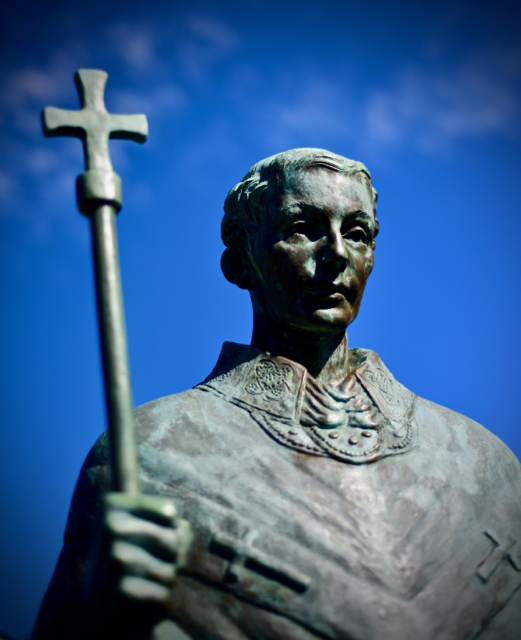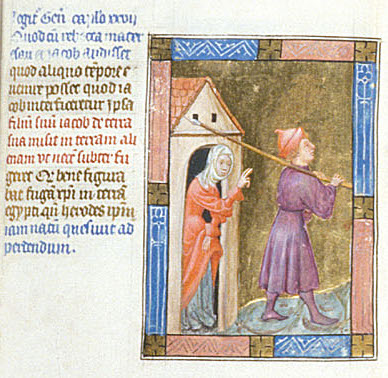I grew up in a Presbyterian church that is now part of the EPC. I know lots of Methodists. I am an Episcopalian, what some call “Catholic light.” But I don’t get the joke. What does it even mean? “White is the new vanilla?” That makes as much sense. Perhaps I should submit it to CIDU Bill. Anyone?






7 thoughts on “Presbyterians and Methodists?”
Hi Chris,
For me the joke is on the two middle-aged women jogging through an urban park. They are talking about an affirmation which corresponds to a reality which is rather opaque to someone looking from the outside in. That they would be carrying on as they are is funny in and of itself. That it is precisely two middle-aged women jogging through an urban park coiffed as they are who are having this conversation makes perfect sense.
Since I am of the right ilk, I know exactly how to reply to the statement in the cartoon. “If only that were true.” If only it were true that mainline Presbyterians did not have a suicidal commitment to the Christ of culture (to use Richard Niebuhr’s diction). If only they had the balls to recover a sense of Christ against culture and Christ the transformer of culture, elements of a robust Christology which mainline Methodists are also in danger of losing.
Where mainline Episcopalians (as opposed to breakaway Anglicans) stand on these questions at the moment, in terms of trend, is something you may choose, or not, to address.
John, your comments make a lot of sense. I began life as a birthright Quaker. Our family then became Presbyterians, not because of our theology, but because my dad was baptized a Presby. I am now a retired Presby pastor. My observations are that, whatever denomination, the clergy preach and practice the theology, while the people take their religious cues from their neighbors. I suppose the saying, “White is the new vanilla” means that conservative folk are now the new (assertive) majority.
Thank you John and Lee. It seems to me all our mainline churches are losing their calling and mission. We have had these discussions before, but I firmly believe that if all we have to offer people is the message of “be nice and do good work” then people will simply listen to A Prairie Home Companion and Garrison Keillor’s monologues. Why go to church?
The church is a place to be welcoming, affirming, healing, and challenging. (After all, how can one be healed if there is no challenge to one’s illness?) Again, as I have said before, we cannot forget to preach about sin, not to make people feel bad but so that we can know what is wrong with our world and ourselves AND know what the remedy is. Only then can we receive it and go about offering it to others.
Chris, your mention of the importance of preaching about sin reminds me of the present scandal/affliction at PSU. Was there any public event which expressed a public lamentation of the individual and community crimes (sins)? Is there a group of religious leaders who are boldly leading the way for our community to express remorse, make confession of sin, and ask forgiveness, and work toward reconcilation?
I stopped reading the news about the scandal because it seems people continue to look for pariahs to blame. It seems we the public are absent from so-called healing process. If so, is it because of lack of spiritual leadership? What are preachers saying in their pulpits about this scandal?
Lee, I cannot speak for other churches. I have not heard any such sermons in ours, but I have to be fair and note that I have not been attending very regularly during this time so our rector may well have given a strong and powerful sermon on the subject. I know that many of the campus religious organizations have addressed it. In our appropriately secular way, the university is addressing it also through course offerings (Ethics and Philo courses) as well as having various workshops and sessions for faculty and staff. Not the same as calling for repentance but still a corporate means of taking responsibility.
One particularly public event I want to note: The Monday after the charges were announced our students organized not only the “Blue Out” in honor of the victims and to raise money for the charity, but also the candelight vigil at Old Main. Many saw this as an apology by the students for the riot that took place on Wednesday, but they don’t realize it was planned before Wednesday’s announcements and all led by the students. At the vigil there was what I would call a public lamentation for the suffering of the victims. I am not sure one could say that they were lamenting “community sins” but they certainly were making it clear that such behavior was not what they uphold and that they support the children violated.
Chris, it may be that our town and gown communities are too diverse to bring about an observable public event or two in our process of healing, that our communities may heal in a zigzag fashion with pockets of healing here and there until such time as we are made more or less whole.
Yes, you should!